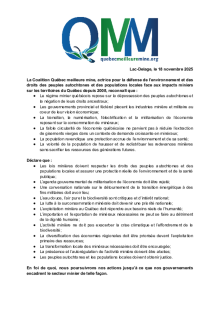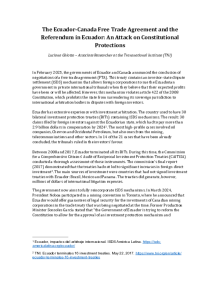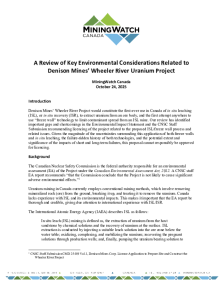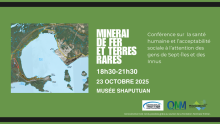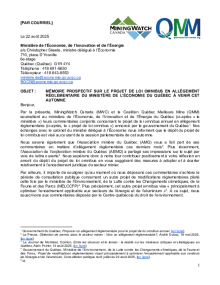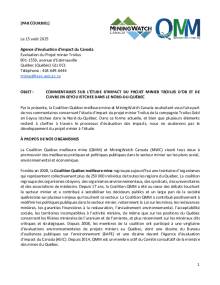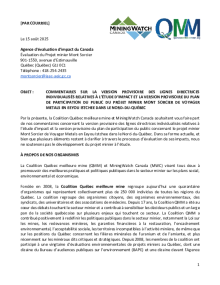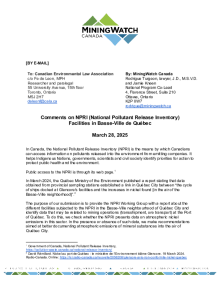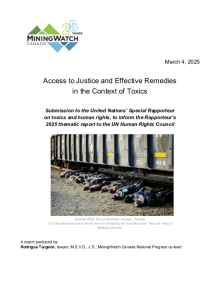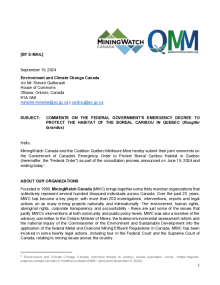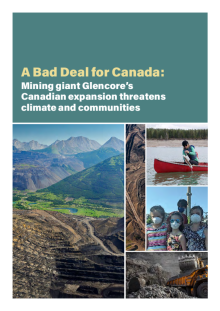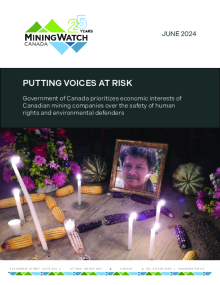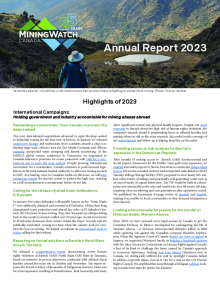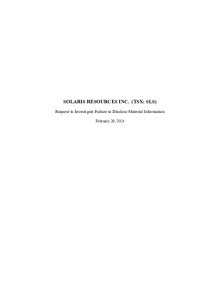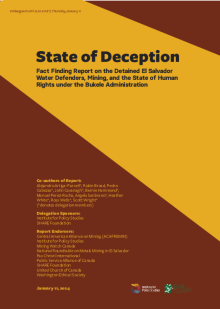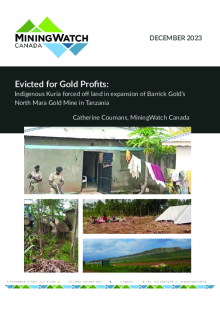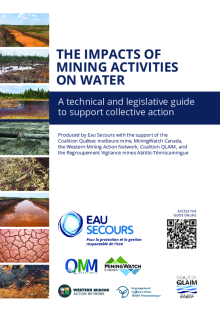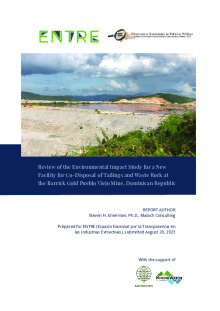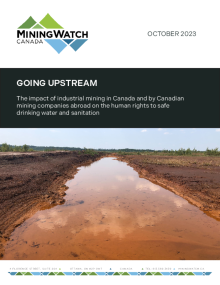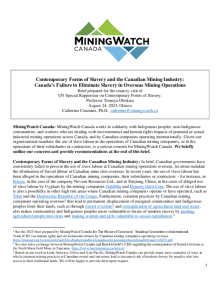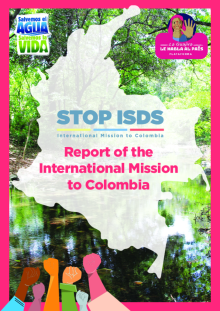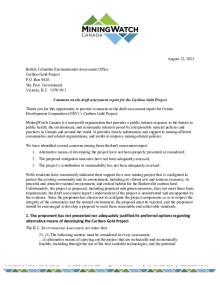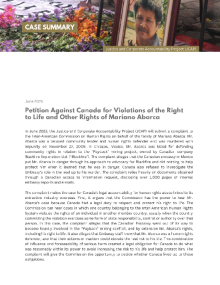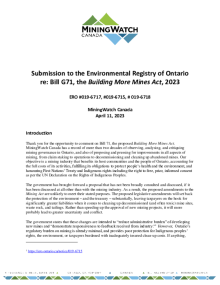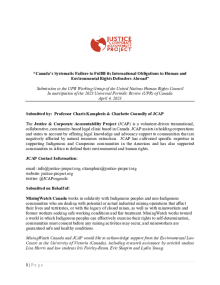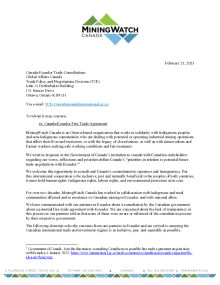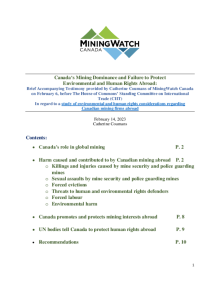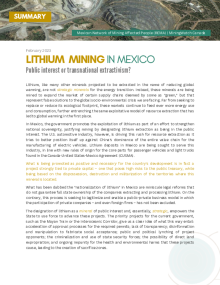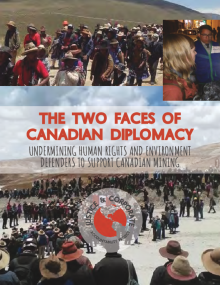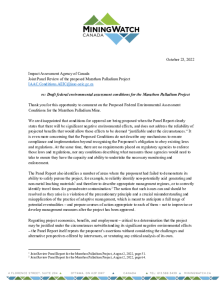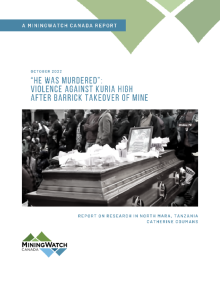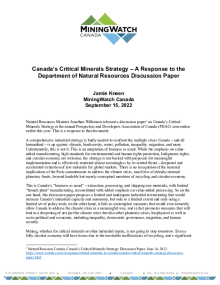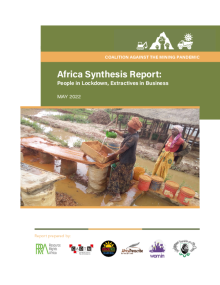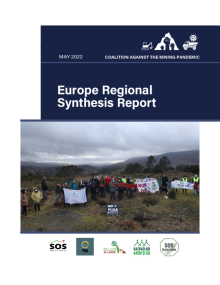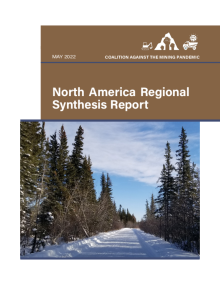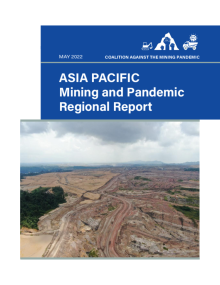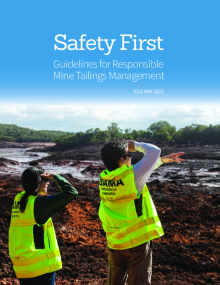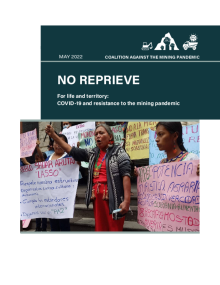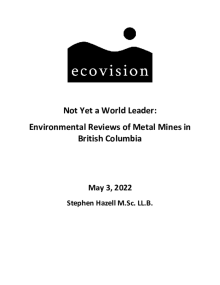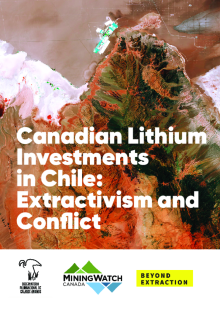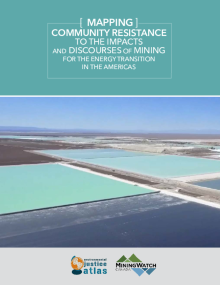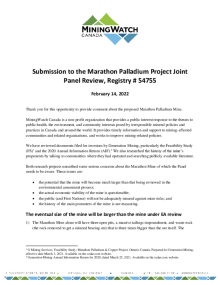The Ecuador-Canada Free Trade Agreement and the Referendum in Ecuador: An Attack on Constitutional Protections
Canada’s National Contact Point for the OECD Guidelines: An Ineffective Human Rights Mechanism
A Review of Key Environmental Considerations Related to Denison Mines’ Wheeler River Uranium Project
Denison Mines’ Wheeler River Project would constitute the first-ever use in Canada of in situ leaching (ISL), to extract uranium from an ore body, and the first attempt anywhere to use “freeze wall” technology to limit contaminant spread from an ISL mine. Our review has identified important gaps and shortcomings in the Environmental Impact Statement and the CNSC Staff Submission recommending licencing of the project related to the proposed ISL/freeze wall process and related issues.
Iron ore and rare earths: Conference on human health and social license for citizens of Sept-Îles and the Innu people
In response to an initiative by the Sept-Îles Citizens' Group, MiningWatch Canada and the Coalition Québec meilleure mine held an information evening on human health and social license concerning critical minerals, particularly iron ore and rare earth elements. The evening aimed to provide the public with an independent overview of current and future mining development in the Sept-Îles region.
Between flaws, setbacks, and timid progress: Findings after 25 years of mining-related consultations
Prospective brief on the omnibus bill on regulatory relief from Quebec's Ministry of Economy coming this fall
Comments Submitted to the IAAC on the Troilus Mining Project (Impact Assessment)
Comments Submitted to the IAAC on the Mont Sorcier Mining Project (Guidelines)
Report: Impacts of Nouveau Monde Graphite's exploration work on water in Haute-Matawinie
Community and environmental groups have prepared an important report on the impacts of mining exploration activities by Nouveau Monde Graphite (NMG) in Matawinie. Following an independent community environmental monitoring campaign, the report identifies numerous cases of heavy metal concentrations in watercourses that exceed environmental protection criteria, likely attributable to exploration activities.
Annual Report 2024: Impact Stories
Our annual report provides some key impact stories from MiningWatch's work in 2024, with additional information about our financial position in 2024.
This year marked a milestone for MiningWatch. Celebrating our 25th anniversary provided an important opportunity for reflecting on the reasons MiningWatch formed when we first opened our doors in 1999, the struggles we’ve supported, the relationships we’ve built along the way, and the immense challenges that lie ahead.
Submission on Bill 5, the Protect Ontario by Unleashing our Economy Act
We find the Act as a whole to represent a disturbingly unaccountable and anti-democratic initiative, in that many of its provisions either bypass, undo, or override established processes, reserving decision-making authority to Ministers or Cabinet and removing those decisions from the purview of the Legislature or any other deliberative and publicly-accountable body or process.
Strategic decarbonisation of the Canadian iron and steel industry: A worker-centered path to cut emissions, increase value added and strengthen global supply chains
The global steel, iron and metallurgical coal industry is emission intensive: the Canadian steel industry contributes to 2 percent of national emissions. Many emission-intensive Canadian steel mills either do not have plans in place, or are experiencing delays and a lack of clarity about the path to reaching net-zero emissions by 2050 – which is both a government and Canadian Steel Producers Association (CSPA) target.
Reflections on Legal Proceedings in Canada against Barrick Gold Regarding the North Mara Gold Mine in Tanzania
Between 2022 and 2024, Indigenous Kuria from villages surrounding North Mara Gold Mine in Tanzania filed cases in Canada against Barrick Gold Corporation for alleged human rights abuses in and around the North Mara mine. MiningWatch Canada attended the hearings in Toronto and has prepared this report where we:
Centering Human Rights in the Rush for Critical Minerals
MiningWatch Canada makes a submission to the UN Special Rapporteur on Climate Change, to inform the rapporteur’s upcoming report on “Human Rights in the Life Cycle of Renewable Energy and Critical Minerals.”
This submission highlights several examples of human rights violations linked to mining for critical minerals, from initial claims staking to exploration, exploitation, and recycling. While our focus is on mining in Canada and the activities of Canadian mining companies abroad, these violations are common globally.
Comments on NPRI (National Pollutant Release Inventory) Facilities in Basse-Ville de Québec
In Canada, the National Pollutant Release Inventory (NPRI) is the means by which Canadians can access information on pollutants released into the environment from emitting companies. It helps Indigenous Nations, governments, scientists and civil society identify priorities for action to protect public health and the environment.
Public access to the NPRI is through its web page.
Access to Justice and Effective Remedies in the Context of Toxics
Submission to the United Nations’ Special Rapporteur on toxics and human rights, to inform the Rapporteur’s 2025 thematic report to the UN Human Rights Council.
Mine Security - Crossing Boundaries, Abusing Rights
The role of mercenaries, mercenary-related actors and private military and/or security companies (PMSCs) in the exploitation of natural resources.
Submission to the United Nations Working Group on the use of mercenaries to inform the Working Group's report to be presented to the 60th Session of the Human Rights Council in September 2025.
This submission updates and expands on MiningWatch Canada’s 2019 submission to the United Nations Working Group on the use of mercenaries with a focus on:
Analysis on Bill 63 in Quebec, An Act to Amend the Mining Act and other provisions
On May 28, Québec’s Minister of Natural Resources and Forests, Maïté Blanchette Vézina, tabled Bill 63, an Act to amend the Mining Act and other provisions. The Coalition Québec meilleure mine (QMM) carried out an exhaustive analysis of the bill. In this brief, we present our general comments and proposed amendments. A detailed article-by-article analysis of the bill is available in the French version of this brief, originally published in September 2024 and available online.
Giant Evictions, Giant Profits
25 Years: A Bedrock for Mining Justice
MiningWatch Canada launched as a pan-Canadian initiative on April 1, 1999, on the heels of a decade that saw an unprecedented global expansion of mining brought about by economic globalization. Indigenous, environmental, social justice, and labour organizations came together with different backgrounds and experiences to respond to threats posed by irresponsible mining practices in Canada and around the world.
ELAW: Preliminary Comments on Panama Cobre find Dam at Serious Risks of Failure
Experts from the Environmental Law Alliance Worldwide (ELAW) say First Quantum’s Cobre Panama tailings dam is at very serious and imminent risk of failure due to internal erosion and a lack of proper monitoring. ELAW's report analyzes the Ninth Monitoring Report, presented by Minera Panama, a subsidiary of First Quantum Minerals that operates the Cobre Panama mine, in September 2024, together with other documents that were provided by the Ministry of Environment to ELAW experts who visited Panama in November 2024.
Submission to Canadian Ombudsperson for Responsible Enterprise Review Committee
For over a decade, MiningWatch Canada and the Canadian Network on Corporate Accountability (CNCA) have advocated for an effective and independent ombudsperson with the powers to compel documents and witness testimony, in an effort to hold Canadian companies accountable for abuse at their operations overseas.
Reported Violence against Indigenous Kuria by Mine Police at Barrick Gold’s North Mara Gold Mine during 2023-2024
This year, MiningWatch gathered information on alleged violence against Kuria villagers in 2023 and 2024 carried out by police assigned to the mine. We received information on 28 cases and conducted interviews with alleged victims and family members of those who have been killed. The 28 cases include villagers who have been shot and killed, shot and survived, beaten to death, arrested and tortured, and maimed in a life-altering way through being hit by a teargas canister.
Canada's Mining Footprint in Ecuador: A brief on the impacts of mining as trade negotiations advance
Canada and Ecuador are in their fourth round of negotiations towards a free trade agreement set to dramatically expand Canadian mining investment in the South American country.
Comments on the Federal Government's Emergency Decree to Protect the Habitat of the Boreal Caribou in Quebec
MiningWatch Canada and the Coalition Québec Meilleure Mine hereby submit their joint comments on the Government of Canada's Emergency Order to Protect Boreal Caribou Habitat in Quebec (hereinafter, the "Federal Order") as part of the consultation process announced on June 19, 2024 and ending today.
A Bad Deal for Canada: Mining giant Glencore’s Canadian expansion threatens climate and communities
Global commodity trading and mining giant Glencore, a notorious corporation with a long and steady record of irresponsible behaviour, was just approved to dramatically expand its presence in Canada by taking possession of four massive coal mines in British Columbia.
This report looks at some of the reasons there is a great deal to worry about. Among them are significant climate and environmental risks, and Glencore’s dismal track record on human rights, environmental protections, climate, and corruption.
Putting Voices at Risk: Brief to UN Special Rapporteur Mary Lawlor on Canada's support for mining over human rights
To accompany a meeting with UN Special Rapporteur on the situation of human rights defenders, Mary Lawlor, we provide six case studies spanning 17 years that demonstrate Canada's failures to respect human rights when it comes to mining. The first two case studies precede Canada’s adoption in 2016 of Voices at Risk: Canada’s Guidelines on Supporting Human Rights Defenders (Voices at Risk). Events outlined in the four subsequent case studies take place after the adoption of Voices at Risk.
Annual Report 2023: Key Highlights
Our annual report provides some key highlights from MiningWatch's work in 2023, with additional information about our financial position in 2023.
International Campaigns: Holding government and industry accountable for mining abuses abroad
Human Rights Violations, Abuses, and Incidents Registered During the Protests Against the Mining Contract in Panama (October-November 2023)
Panamanian organizations released a report documenting the rights violations and criminalization of activists during last year’s large-scale protests over First Quantum Minerals’ copper mine, Cobre Panamá.
Solaris Resources: Request to Investigate Failure to Disclose Material Information
The Shuar Arutam People (PSHA) filed a complaint against Solaris Resources Inc. (TSX: SLS) before the British Columbia Securities Commission over its failure to continuously disclose material information to shareholders regarding its Warintza mining project which overlaps PSHA’s titled territory. In spite of PSHA's explicit and continuous rejection of the Warintza project, Vancouver-based Solaris has kept moving forward with its mining plans in the Amazon, one of the most biodiverse areas on the planet.
State of Deception
Evicted for Gold Profits: Indigenous Kuria forced off land in expansion of Barrick Gold’s North Mara Gold Mine in Tanzania
Impacts of Mining Activities on Water: A technical and legislative guide to support collective action
In Quebec, the media often singles out the mining industry for being a repeat offender. This reputation stems from the bad practices of certain mine developers who have abandoned contaminated mine sites and left Quebec residents on the hook for billions of dollars for restoration, turned rivers red for dozens of kilometres, or have used lakes as dumping grounds for the tailings from iron ore processing plants.
Review of the Environmental Impact Study for a New Facility for Co-Disposal of Tailings and Waste Rock at the Barrick Gold Pueblo Viejo Mine, Dominican Republic
Mine waste safety expert Dr. Steven Emerman released findings of his independent review of Barrick Gold’s Environmental and Social Impact Assessment for the Naranjo Tailings Storage Facility (TSF), warning that the Canadian mining giant is failing to adequately disclose the environmental and social risks posed by its planned expansion at the Pueblo Viejo mine in the Dominican Republic.
Lighting summary:
Going Upstream: The impact of industrial mining on the human rights to safe drinking water and sanitation
Brief prepared for the country visit of the UN Special Rapporteur on the human rights to safe drinking water and sanitation, Pedro Arrojo-Agudo.
Since 1999, MiningWatch has provided technical expertise and advocacy support to hundreds of communities across the globe as they assert their rights to safe drinking water and sanitation in the face of imminent and past harm by industrial mining.
Contemporary Forms of Slavery and the Canadian Mining Industry
MiningWatch Canada submitted a brief to the UN Special Rapporteur on Contemporary Forms of Slavery, ahead of Professor Tomoya Obokata's country visit to Canada.
Stop ISDS: Report of the International Mission to Colombia
In May 2023, a delegation of 13 representatives from social and environmental justice organisations from eight countries in the Americas and Europe visited Colombia to share experiences of struggles against the global investment protection regime. The mission also went to learn firsthand about the peoples and ecosystems being threatened by corporate lawsuits, as well as the environmental, social and cultural harms that transnational investments have already caused, particularly in the departments of La Guajira and Santander.
Comment on the Draft Assessment Report for the Cariboo Gold Project
This is MiningWatch Canada's submission to the British Columbia Environmental Assessment Office, commenting on the draft final assessment report for Osisko Development Corporation (ODV)’s Cariboo Gold Project in Wells, British Columbia.
Petition Against Canada for Violations of the Right to Life and Other Rights of Mariano Abarca
In June 2023, the Justice and Corporate Accountability Project (JCAP) submitted a complaint to the Inter-American Commission on Human Rights on behalf of the family of Mariano Abarca. Mr. Abarca was a beloved community leader and human rights defender who was murdered with impunity on November 27, 2009, in Chiapas, Mexico. Mr. Abarca was killed for defending community rights in relation to the “Payback” mining project, owned by Canadian company Blackfire Exploration Ltd. (“Blackfire”). The complaint makes the case for Canada’s legal accountability for human rights abuse linked to its extractive industry overseas.
Submission to the Environmental Registry of Ontario re: Bill G71, the Building More Mines Act, 2023
This submission on Ontario Bill 71, the proposed Building More Mines Act, observes that the government has brought forward a proposal that has not been broadly consulted and discussed, if it has been discussed at all other than with the mining industry. As a result, the proposed amendments to the Mining Act are unlikely to meet their stated purposes.
Canada’s Systematic Failure to Fulfill its International Obligations to Human and Environmental Rights Defenders Abroad
Corporate accountability experts sent a 30-page submission to the UN Human Rights Council ahead of its April 2023 Universal Periodic Review of Canada, denouncing Canada for its continued diplomatic support of mining companies over the safety of human rights and environment defenders (HRDs).
Submission Regarding a Possible Canada-Ecuador Free Trade Agreement
MiningWatch Canada submits our response to the Canadian government, as part of a consultation with civil society on a potential Free Trade Agreement with Ecuador. We are concerned about a lack of transparency in this process for our partners in Ecuador, who were unaware or informed about the consultation process.
Canada’s Mining Dominance and Failure to Protect Environmental and Human Rights Abroad
Harm caused or contributed to by Canadian mining companies, their subsidiaries and contractors overseas is widespread globally and persistent. It includes environmental degradation that will persist for hundreds of years, a wide range of human rights harms, abuses of Indigenous rights, as well as negative economic and financial impacts at local and national levels. Together, these impacts have serious and long-term repercussions on local and national development.
Summary: Lithium Mining in Mexico - Public interest or transnational extractivism?
In Mexico, the government promotes the exploitation of lithium as part of an effort to strengthen national sovereignty, justifying mining by designating lithium extraction as being in the public interest. But what is being promoted as positive and necessary for the country's development is in fact a project strongly tied to private capital – one that poses high risks to the public treasury, while being based on the dispossession, destruction and militarization of the territories where this mineral is located.
Reporting of Toxic Substances Released by Mining under the NPRI (National Pollutant Release Inventory)
This report looks at three examples of the application of the NPRI in the mining sector: the 2013 Obed Mountain coal mine spill in Alberta, the 2014 Mount Polley mine spill in British Columbia, and the Key Lake uranium mine and mill in Saskatchewan. These three cases show both some of the utility of the NPRI and some of its limitations in practical applications to support public interest research, policy development, and regulation.
The Two Faces of Canadian Diplomacy: Undermining Human Rights and Environment Defenders to Support Canadian Mining
Globalized industrial resource extraction is unsustainable from an environmental and social perspective, and Indigenous peoples are often on the front lines of alerting humanity to the resulting harms. Community members and their allies become environment and human rights defenders (HRDs) when they publicly allege harms on the part of state or company actors. As extraction intensifies around the world, so has the criminalization, threats, attacks, and even killings of HRDs. International bodies now regularly refer to this situation as a global crisis.
Comments on Proposed Federal Approval Conditions for the Marathon Palladium Mine
MiningWatch Canada has submitted comments on the draft federal environmental assessment conditions for the Marathon Palladium Project, where we express deep concern that the project is advancing in spite of the projected negative environmental effects and argue that a much more comprehensive and prescriptive set of conditions is required.
“He was murdered”: Violence against Kuria High after Barrick Takeover of Mine
This report presents findings from research undertaken by MiningWatch Canada in North Mara, Tanzania, in September 2022. The issues addressed in this report have all occurred since Barrick’s September 2019 takeover of mine ownership and under Barrick’s CEO Mark Bristow. Findings are based on information provided by, among others, elected officials, community leaders, victims of violence by police who receive direct financial and other benefits from the mine (mine police), and family members of those who have perished as a result of excess use of force by mine police, as well as information provided by victims of violent and inequitable forced evictions, the legality of which is questionable.
Canada’s Critical Minerals Strategy – A Response to the Department of Natural Resources Discussion Paper
Natural Resources Minister Jonathan Wilkinson released a discussion paper on Canada’s Critical Minerals Strategy at the annual Prospectors and Developers Association of Canada (PDAC) convention earlier this year. This is a response to that document.
Coalition Against the Mining Pandemic - Africa Synthesis Report: People in Lockdown, Extractives in Business
Covid-19 has created deeper inequalities and increased poverty while richer households and nations have begun to recover; the world’s poor and working class continue to absorb its impacts.
The Covid-19 pandemic highlights the relationship between the failures and contradictions of capitalism and the global destruction of nature and deepening socio-economic inequalities. The manner in which Covid-19 continues to unfold reflects the rhythm of existing patterns of exploitation, placing at the centre of its destructive path the world’s already vulnerable people.
Coalition Against the Mining Pandemic - Europe Regional Synthesis Report
This report explores, through research and a series of first-hand accounts, how extractive industries have sought to benefit from the Covid-19 pandemic, advancing mining agendas and shrinking civic space. Key themes are presented throughout case studies in Turkey, Northern Ireland, and Spain. This report was developed by the Europe Coordinating Committee of the Coalition Against the Mining Pandemic.
Coalition Against the Mining Pandemic - North America Regional Synthesis Report
This report analyzes the mining industry’s operations in North America over the course of the COVID-19 pandemic to date, with a particular focus on the Canadian context. Drawing from an analysis of over fifty news articles, and academic literature and phone interviews, it highlights the social and environmental impacts of these operations on local communities and seeks to bring to light regulatory changes introduced under the cover of the pandemic.
Asia Pacific: Mining and Pandemic Regional Report
This report was developed by the Coalition Against the Mining Pandemic - Asia-Pacific. The report discusses the nexus of the COVID-19 pandemic and the mining industry in India, Indonesia, the Philippines, and Papua New Guinea, showing how the mining industry and governments in the region have reaped benefits from the pandemic. It also explores how mining-affected communities respond to the social and ecological crisis that they experience.
Updated: Safety First – The Peoples’ Tailings Standard To End Mine Waste Disasters
This is a revised version of "Safety First", Published jointly by Earthworks (USA) and MiningWatch Canada, it updates the guidelines for safety, respect for affected communities, and corporate accountability that must be incorporated into any tailings standards or regulations.
No Reprieve: For life and territory - COVID-19 and resistance to the mining pandemic
This report was developed by the Coalition against the Mining Pandemic – Latin America. It unmasks the unbridled advance of mining during the pandemic, for which reason communities and peoples in Latin America could not let their guard down even while taking measures to protect themselves from COVID-19.
Not Yet a World Leader: Environmental Reviews of Metal Mines in British Columbia
In this report, Ecovision’s Stephen Hazell challenges British Columbia premier John Horgan’s claim that the province’s 2019 Environmental Assessment Act (BCEAA) is “world-leading”. “Not Yet a World Leader: Environmental Reviews of Metal Mines in British Columbia” finds that B.C actually lags other key jurisdictions by failing to assess some proposed metal mines that may have significant adverse effects.
Canadian Mining Investments in Chile: Extractivism and Conflict
In its Andean salt flats, Chile has one of the largest proven reserves of lithium in brines and is a leading exporter of both lithium and copper -- two minerals identified as "critical" for the energy transition. But "green extractivism" has caused conflict in Indigenous and rural territories in Chile, threatening communities and environmental defenders who are currently facing the impacts of the COVID-19 pandemic as well as climate change that the electric vehicle (EV) market promises to solve. This brief report seeks to explain the responsibility of Canadian investments in the emergence of new socio-environmental conflicts in Chile’s salt flats, in an effort to contribute to the national and international debate on possible futures with climate justice as a cornerstone in the development of policies that go beyond a corporate energy transition towards a real and socio-ecological transformation.
Mapping Community Resistance to the Impacts of Mining for the Energy Transition in the Americas
Full report: The global mining industry, often supported by host governments, is positioning mining as a “green solution” to the climate crisis. This “green mining boom” is rapidly expanding into culturally and ecologically sensitive areas, increasingly affecting Indigenous and human rights, community livelihoods and the environment. Communities, academics, and activists say that an energy transition that heavily depends on mining new materials without considering materials and energy for what, for whom, and at what socio-environmental costs will only reinforce injustices and lack of sustainability that have deepened the climate crisis in the first place.
Submission to the Marathon Palladium Project Joint Panel Review
These comments were submitted to the Joint Panel reviewing the environmental impact of the proposed Marathon Palladium Mine. We have reviewed documents filed for investors by Generation Mining, particularly the Feasibility Study (FS) and the 2020 Annual Information Return (AIF). We also researched the history of the mine’s proponents by talking to communities where they had operated and searching publicly available literature.
Both research projects unearthed some serious concerns about the Marathon Mine of which the Panel needs to be aware. These issues are:
